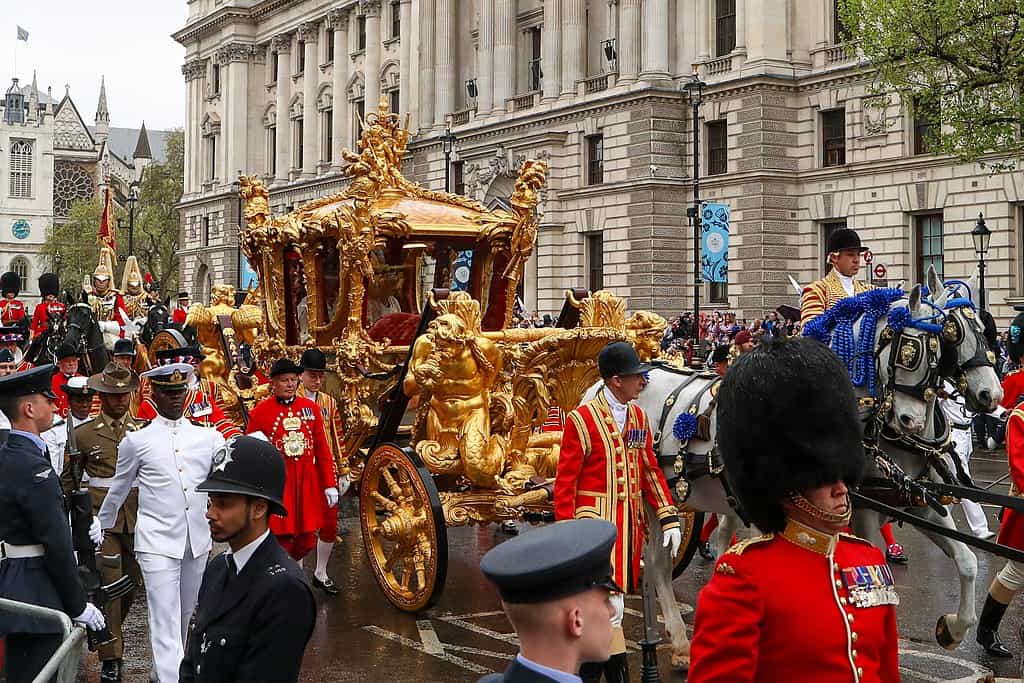As we reflect on the King’s coronation, it might be worth talking about the monarchy.
First of all, it is as well to start by pointing out that, overall, 62 per cent of the population support the monarchy compared to 22 per cent who would prefer an elected head of state. The balance (16%) don’t know.
Given that, it is unsurprising that no political party ever talks about abolishing the monarchy. Retention of the monarchy was explicitly included as one of the pillars of Scottish independence, the SNP knowing full well that any other position would lose them a chunk of votes.
Yet events like the coronation are inevitably accompanied by outrage from the fringe republican groups, full of their own self-righteousness in the face of public opinion.
This week it might be worth reflecting on what the monarchy brings and why it might be an important element of British life.
Over the last several decades, the progressive and liberal fronts of political debate have been complicit in undermining almost everything that holds a country together. The idea of personal responsibility has been progressively displaced by the deadening and paralysing effect of state bureaucracy. The idea of helping our neighbours has been undermined by the idea that it is the state’s job not ours to help those in need.
This sort of thinking maybe reached its worst in the 1970s when regions were reorganised on bureaucratic lines and given names seemingly decided by committee with no thought for historical background or people’s pride in their sense of place.
Then came the progressive undermining of the idea of the nation state in the pursuit of an ill-defined ‘internationalism’.
Patriotism was intentionally enmeshed with nationalism so that it could be undermined. The flag and any other display of patriotism were treated with disdain. All destructive and counter-productive as even the Labour Party has now recognised and is trying to reverse – a process that is somewhat cringingly painful to watch.
As a result of all this, we now live in a world where soulless bureaucracy has taken over our lives, displacing anything that might generate inspiration, motivation and a sense of belonging. This is not exclusively a British problem. It mostly affects all ‘developed’ countries and has maybe reached its apogee in the European Union.
It all begs the question: what is it that there is left that holds us together? Without a clear answer to that question, solidarity, a sense of belonging, and any sense of responsibility towards others in our society will continue to wither away with drastic social consequences.
In such a dry and soulless landscape, the monarchy stands out. Yes, it stands out as something from a previous age – and that may be part of its strength.
Nostalgia is an embedded human trait that is not going away. We might as well harness it for good.
A constitutional monarchy that provides a strong symbol of the nation, is above the political fray and has no meaningful political power may be one of the only things left that people of all types can cling on to when drowning in the dreary gruel of insipid, mind-numbing managerial bureaucracy and the rejection of human beings as emotional creatures.
The Duke of Windsor, living in France following his marriage, explained it like this to his French friends who were bemused by all the pomp and circumstance surrounding the coronation of the late Queen: “Why have reality when you can have magic? Why have prose when you can have poetry? Why have a woman when you can have a goddess?”
It reminds me of the wonderful magic realism literature of the renowned South American authors.
Those of a Cartesian bent might see all this as emotional drivel. I won’t be trying to convince them, but I hope that they themselves don’t believe in unadulterated rationalism enough to end up leading a joyless life stripped of emotion.
Let’s also get down to practicalities.
The British monarchy remains one of the most powerful institutions to project the country’s soft power. The UK consistently scores high on soft power (almost always second after the United States) and the monarchy plays a meaningful role in that. Reportedly, three billion people worldwide watched the funeral of the late Queen. All of this makes some difference to the UK’s economic performance.
The Prime Minister’s weekly audience with the monarch may also seem anachronistic. Yet it is valuable. It places a degree of moral pressure on any PM explaining government policy and action to the monarch. When Boris Johnson prorogued parliament, there was more outrage at the fact that he had misled the Queen than at the illegality of the manoeuvre. And heaven knows that we need more rather than less moral pressure on our elected politicians.
Of course the monarchy is a human institution populated by human beings. It is far from perfect as the turmoil of the last few years has shown.
But the issue is not a fruitless search for perfection but, rather, whether we are better off with it or without it.
For me, the answer is clear. As it seems to be for the majority of the population. So I hope we all celebrated joyfully last weekend that, in this turbulent and increasingly divided world, we have something in this country that remains, maybe tenuously, a symbol of shared values – however nebulous those might be – and one of the few things left that still has the power to unite.
Let’s enjoy the poetry while we can and before we unfortunately have to return to our daily prose, shorn of any magic.





